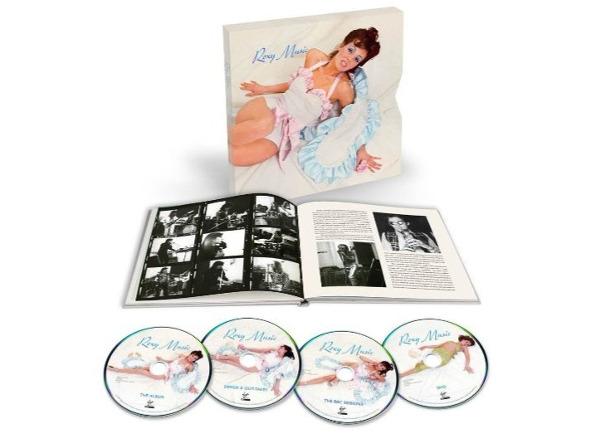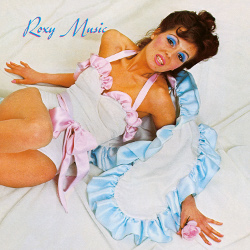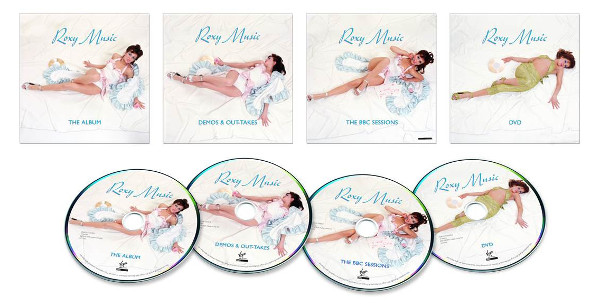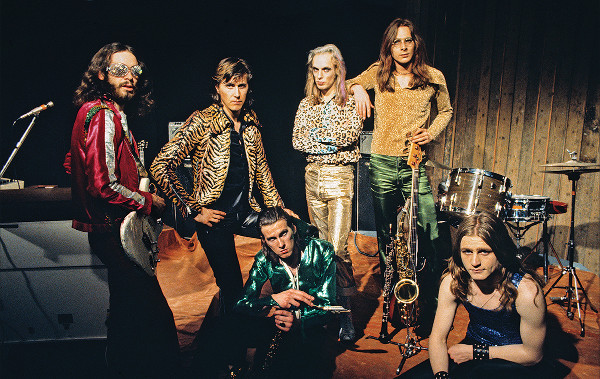This man is somehow able to coax magic out of these older recordings. Emerson, Lake, and Palmer, King Crimson, Jethro Tull, XTC, Yes, etc, never sounded so good.
Roxy Music’s Self-Titled ‘Re-Make/Re-Model’ of Rock Convention Gets a Rich 5.1 Upgrade

Roxy shook up the form’s visual sensibilities with a highly stylized, playfully suggestive front cover featuring internationally renowned fashion model Kari-Ann Muller, clad in a pink-and-white satin swimsuit and sprawled out with a shiny gold record placed just out of the reach of her outstretched right hand on the back cover. Not only that, but the music found within such provocative packaging undisputedly forged new ground — most especially the way the always forward-thinking master synth/tape operator Brian Eno manipulated the otherworldly sounds he was able to coax out of an EMS VCS3 portable synthesizer.
 “It’s easy to forget very few bands even had a VCS3 synthesizer in those days,” points out Roxy Music guitarist Phil Manzanera (at left in the photo below, wearing the “bug” glasses). “Pink Floyd had one and we had one, but I can’t think of anyone else who was using one at the time. There may have been a Moog out there somewhere, but not in the way we and [Floyd keyboardist] Rick Wright were using the VCS3. It was more of an electronic soundscape idea, with the difference being it’s coming from within the context of a pop band.”
“It’s easy to forget very few bands even had a VCS3 synthesizer in those days,” points out Roxy Music guitarist Phil Manzanera (at left in the photo below, wearing the “bug” glasses). “Pink Floyd had one and we had one, but I can’t think of anyone else who was using one at the time. There may have been a Moog out there somewhere, but not in the way we and [Floyd keyboardist] Rick Wright were using the VCS3. It was more of an electronic soundscape idea, with the difference being it’s coming from within the context of a pop band.”
And now, the Roxy Music party is being properly feted with a 45th anniversary special edition 3CD/1 DVD set that includes demos, outtakes, BBC Sessions, and surround sound guru Steven Wilson’s wholly immersive 96kHz/24-bit DTS-HD Master Audio 5.1 mix. I got on the line with Manzanera, 67, to discuss the band’s intuitive sense of interplay, why the album’s intent comes across even better in surround, and how he was able to ultimately pass the band audition. Next time is the best time, we all know. . . .
Mike Mettler: The individual relationships between the players is one of the things that makes Roxy Music such a special album, in my opinion. You and [vocalist] Bryan Ferry, Brian Eno, and [saxophonist/oboist] Andy Mackay all have what I call an interplay shorthand. Did you feel you were working more directly with one person in certain sections of each song, or was it more of a group feel overall?
Phil Manzanera: Definitely in the instrumental bits, we were having conversations, really. That is very much the right way of thinking about it — the idea of having musical conversations. I might play this [verbally mimes a riff], and Andy would play that [mimes another riff], and then Brian would play something else. Then you agree on something, bounce it off each other, and go somewhere else.
And when Bryan is singing, you’re there to support the vocal and the lyric, to try and create a musical context for him. That’s what all of us were really doing on that first album. We were trying to create an interesting musical backdrop and context for this singer with a strange voice — and good looks! (chuckles)

Mettler: Steven Wilson’s surround mix puts us in a space that reinforces how every song on this album really has its own individual character.
Manzanera: It’s very difficult to categorize the styles of the different songs, because they chop and change around. They are a bit like collages — and Bryan, of course, had been taught how to do painting collages by Richard Hamilton when he studied at [Newcastle] University. But I think by a complete sort of luck, he ended up with a bunch of musicians who had this natural thing of being happy with having this blend of stuff. It didn’t have to be a funk or a blues or jazz, or something weird or psychedelic. We were all happy to have this combination of things built around very simple chords.
Mettler: Does the surround version of the album give you something you always wanted to hear, or something you didn’t expect? What does it mean to you?
Manzanera: To me, the 5.1 is the star of the show. Because if you’re a Roxy fan and you’ve heard these tracks for years, you now hear them in a different way. There’s so much to gain, so it’s worth it just for that.
Mettler: I totally agree — especially when you get such an adventurous song like “Ladytron” in 5.1. That’s just manna from heaven.
Manzanera: And obviously, on the original album, it had to be cut really short at the end because of the restrictions of cutting vinyl in those days. To be able to have the whole version of it now is just a delight. When Steven and I were listening back to it, we were jumping up and down, saying, “If people who have heard the original hear this, they’re just going to be thrilled with the extra added Eno stuff at the end!”
Mettler: And I’m one of them, I can tell you that! Is there one particular song in the Roxy canon you would like Steven to mix in 5.1?
Manzanera: (slight pause) Ooh. Actually, I’d say “In Every Dream Home a Heartache” [from 1973’s For Your Pleasure]. I think that would be amazing to hear in surround.

Mettler: Also agreed! OK, we’re putting that one down here officially, so we can give Steven more work to do. (Manzanera laughs) Going back to the Roxy Music album itself, I’d like to get into “Re-make/Re-model,” which really sets the scene of putting us in the literal middle of the party that starts the whole album. On it, your guitar playing is mostly off in the front left quadrant. Was that a physical-space decision as to, “This is where I want to be positioned” in the mix?
Manzanera: Absolutely not! You’ve got to remember, all of us were just thrilled to be there because it was our first time in a studio. We had three sets of five days to record and mix this album, so we were at the mercy of the engineer [Andy Hendfiksen] and the producer, Pete Sinfield. What Pete really did was capture what we’d been doing live. We’d been playing that stuff live for not very long — maybe something like ten gigs — so there was not what eventually became “production” for us, and the way we wound up considering things. It was more “wham, bam, thank you,” so there was no time to do anything but “boom.”
Mettler: As somebody new to the recording experience, did you improvise a lot, or did you have a lot of things worked out beforehand?
Manzanera: I would work some things out, but the solos were more on the spur of the moment. And, obviously, the feedback depended on where I was standing near the amps. But it was all like a dream — being in a studio, you know. It all happened so quickly, and I wasn’t even thinking about stereo positioning, or anything like that.
Mettler: In the back half of “Re-make/Re-model,” everybody gets their own solo sequence. Was that all done on the spot, or did you know what the other person would be playing in those moments?
Manzanera: No, though in fact we had been playing that one live. By then, we all had a little motif we wanted to get across. Mine was more like doing a Duane Eddy type of thing.
Mettler: Right, you brought a more American-like element into the vibe there.
Manzanera: And that was because I had a very different trajectory. I was brought up in Cuba and Hawaii, and I heard Americans coming over playing Buddy Holly, so it was very different than all of the other guys in Roxy. I was brought up watching Elvis films and living a little more of an American dream than these Brits here. (chuckles heartily)
Mettler: That “Day Tripper” bass break done by [founding Roxy bassist] Graham Simpson — was that always what was played in that spot?
Manzanera: Yeah! There are a lot of reference points there. Everybody had their own musical likes, but some things united us all. And you’ve also got a little “Ride of the Valkyries” there, what with Andy [Mackay] being a classical saxophonist and oboist.
Mettler: It’s a nice Wagner embellishment that goes with your own “Peter Gunn”-ish thing going on there. Did any of The Beatles ever comment on the “Day Tripper” bit to you? Did you ever hear about it?
Manzanera: No. Oh, no no no. I think we’re far too insignificant for that.
Mettler: Well, I don’t know about that. To me, “Sea Breezes” seems to be an expansive kind of piece, akin to the pre-Dark Side-era Meddle sound of Pink Floyd. That song served as your own “Echoes,” in a way. And Steven’s surround mix puts us in a space with it that reinforces how every song on this album really has its own character. They’re all very individual, and very moody.
Manzanera: Yeah. “Sea Breezes” is very bleak in parts, and the use of the oboe in it is quite unique. I mean, I’d never heard one used quite like that in pop music, though I know other bands in the ’60s had used one. When I first heard Andy play it, I just went, “Wow.”
Mettler: Also on “Sea Breezes,” you get to follow the distortion angle along with whatever Brian Eno’s doing, as well as Andy’s stuff. It’s a full musical conversation.
Manzanera: And, I must say, it’s not like anything else we ever did either! (chuckles) What’s really great, when I think about Pete [Sinfield] as a producer, is that he didn’t stop us from doing anything. That’s so great, because he could have said, “You know what, guys — that’s just a little too weird. Let’s just back off from that a bit.” But Pete was more like, “Yeah, do it!”
Mettler: Wasn’t that the mantra of Chris Blackwell and Island Records anyway? As in, “Let the artist be the artist. Let them do their thing.”
Manzanera: Yeah, totally! But I must say, Chris Blackwell was totally confused by us. There are some great stories about him just not getting it when he first heard our music, but then the next day walking by the managing director and saying, “Have you signed them yet?” And the director looking totally confused: “I thought you didn’t like them?” Everyone was totally confused, you know! (laughs)
Mettler: At least it all turned out for the best. Last thing, Phil, and you have to answer this truthfully: Are you “the perfect guitarist for an avant-rock group”? [This is a quote from the original September 25, 1971 ad in Melody Maker that Phil answered to audition for Roxy.]
Manzanera: (laughs) I think I ticked every one of the things that they asked for in that ad! [The ad also requested, “Original, creative, adaptable, melodic, fast, slow, elegant, witty, scary, stable, tricky – QUALITY MUSICIANS ONLY”]
I look at it now, and I go, “Yes, yes, OK, that’s me — yeah, yeah.” But then, I think that pretty much describes the band as well. It was very clever.
And where it said, “avant-rock group” — who invented that genre? I’d never heard that before. So in a very small ad, it actually summed up a lot of Roxy, really.
Mettler: Did you feel intimated reading something like that? I mean, that’s a heckuva laundry list of skills to bring to an audition.
Manzanera: Yeah! No, I think I just ignored that. The only fatal mistake they made was not to hire me right away. I failed the audition. But months later, they hired me. [Roxy first went with guitarist David O’List from The Nice, before going back to Manzanera.]
Mettler: Do you poke Mr. Ferry about that every now and then? Like, “You didn’t see what I was capable of right away, did you?”
Manzanera: No, I haven’t really thought about that, actually. But you’ve got me thinking, “Hang on — they made a big mistake there!” Maybe I need to discuss it with them now, to set it right. (laughs heartily)
- Log in or register to post comments


I'm sorry but I could not disagree more. He has destroyed more classic albums with his over wrought mixes and surround circus that he has ever enhanced. Tull and ELP are perfect examples of his disregard for the original concept, sound and mix. I cringe every time I see him messing with these masterpieces.

Considering Ian Anderson was satisfied for the first time ever in the mastering of Aqualung I'd say one of you is mistaken.

Totally fair comment mate. I know he did and it amazes me. Obviously he is the man who's opinion is the number one criteria. That still does not negate my very personal feelings for the work Wilson does. I abhorred what he did to A Passion Play. Makes me cringe whenever I hear it. He changed timing, lyrics, and other stuff that should not be touched. Don't get me started on his messing with Crimson. I friggin hate his stuff! What others see in him I just cannot understand.






























































